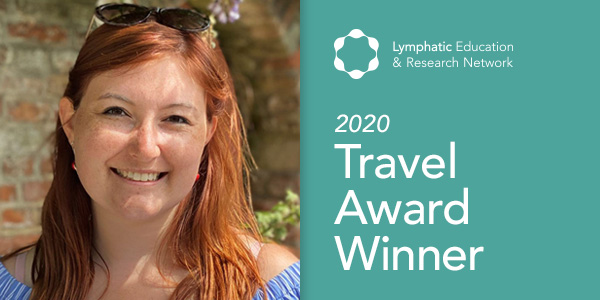Ljuba Ponomarev, currently a Ph.D. student at KU Leuven (Belgium), under the supervision of Prof. An Zwijsen, received a Travel Award from LE&RN to attend the GRC Conference on Lymphatics in early March 2020 in Ventura, CA. We asked Ljuba to share her thoughts on that experience with us and to tell us a bit about her research and future plans.
What did you get out of the Lymphatic Conference? Why did you feel it was important to attend?
It was an amazing opportunity for me to attend this prestigious and well-known GRC Conference on Lymphatics as a second-year Ph.D. student. Not only did I get the opportunity to interact with fellow researchers, but I also fuelled my general knowledge on the lymphatic vasculature. Moreover, I thoroughly discussed experimental design which will help me in my further research. The multiple interesting lectures during the GRC and the GRS Seminar on Lymphatics, the GRC Power Hour, the Patient Session, and of course the very interactive Poster session, where I discussed my poster with peers, all made this conference live up with my expectations.
What are your areas of interest in research?
I am investigating the role of bone morphogenetic proteins (BMPs) and their intracellular effector proteins SMAD1 and SMAD5 in the lymphatic vasculature. By combining cell culture experiments and RNASeq analyses, with studies in mouse and in human patient samples, we want to advance the knowledge on the BMP pathway in lymphatic development and maturation. In this way, we would like to investigate other targeted/patient-tailored treatment possibilities for patients with lymphedema.
What are your hopes and plans for your career and your research?
Personally, I find basic research most exciting if its results can in the end be translated to human health and disease. With our explorative study on the role of the BMP pathway in patients with breast-cancer-related lymphedema, we want to contribute to improving the diagnosis, treatment, and quality of life of these patients. It would be great if some of our results obtained in patients with breast-cancer-related lymphedema would also be translatable to patients with different kinds of genetic and acquired lymphedema.
Why do you believe that, in general, lymphatic research is important? What might the field accomplish within the next few years?
More than 170 million people worldwide suffer from lymphedema. Despite this high prevalence, there is little curative treatment and the patient’s quality of life is drastically reduced. After the courageous testimony of patients with lymphedema and lipedema, organized by LE&RN, I became even more convinced that it is critical to span the gap in our knowledge on the molecular mechanisms that control lymphatic vessels compared to the vast knowledge on the blood vessels. The multiple available mouse models, new markers, and different sequencing technologies etc. enable us now to design experiments that address very specific research questions on lymphatic vessel biology. Our increasing knowledge of the molecular regulation of the lymphatic network will pave that path to design therapies of the future that will be beneficial for patients with lymphatic diseases.
LE&RN programs, like LE&RN Travel Awards, are only possible because of our Partners and Supporting Members. Become a Supporting Member today.

